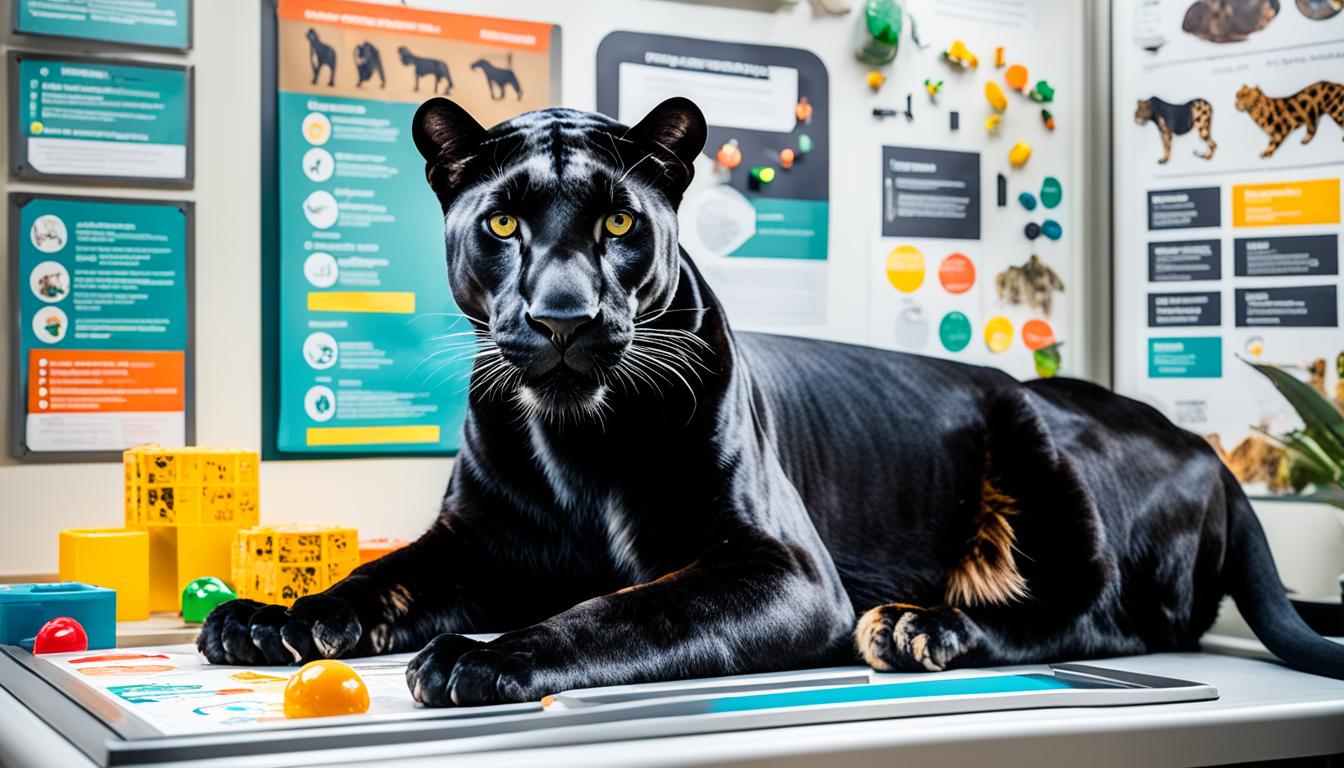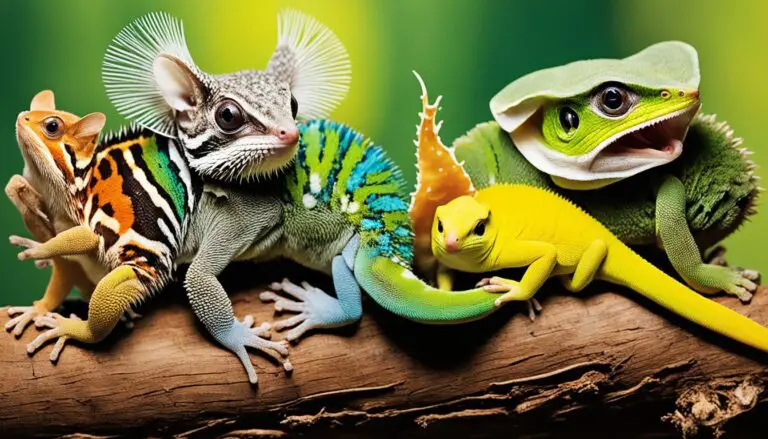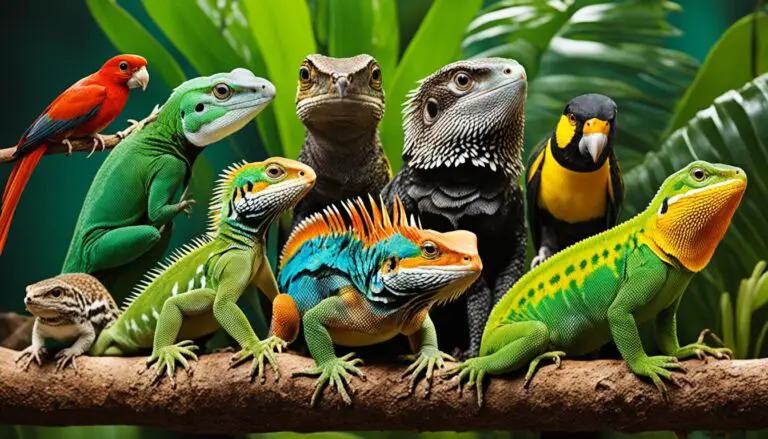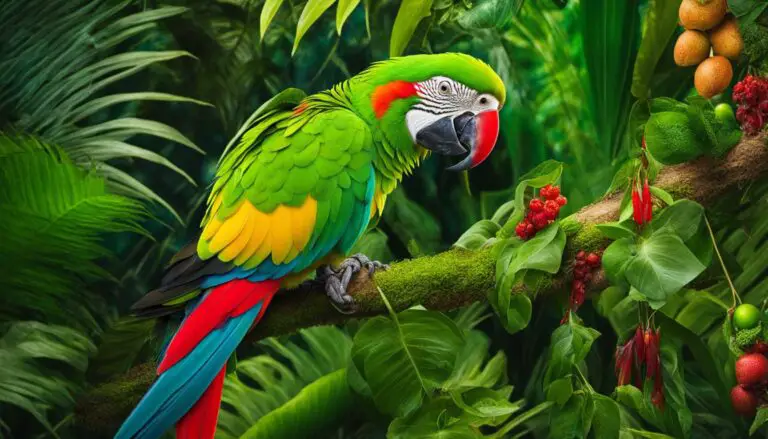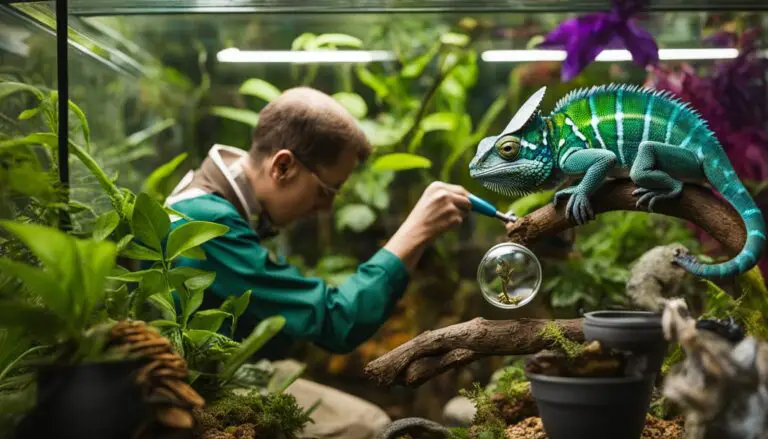Exotic Pet Care for Carnivores: Best Practices
Welcome to our comprehensive guide on caring for exotic carnivorous pets. In this article, we will provide you with the best practices to ensure the health and happiness of your carnivorous pets. From understanding their natural habitat to providing proper nutrition and veterinary care, we will cover all the essential aspects of exotic pet care for carnivores. By following these guidelines, you can be confident in providing the optimal care your pets deserve.
Key Takeaways:
- Understanding the natural habitat of your exotic carnivorous pet is essential for their well-being.
- Replicating both major and microhabitats in their enclosure environment promotes a sense of security and comfort.
- A balanced carnivorous diet is crucial, and recognizing and preventing nutritional deficiencies is important.
- Regular veterinary care, preventive measures, and emergency care planning are key to maintaining optimal health.
- Choosing the correct enclosure and safe substrate options provide a suitable environment for your pet.
Understanding Your Carnivorous Exotic Pet’s Natural Habitat
Understanding the natural habitat of your carnivorous exotic pet is essential for providing optimal care and ensuring their well-being. By replicating the major and microhabitats of their natural environment and creating an ideal enclosure, you can help your pet thrive.
The Importance of Replicating Major and Microhabitats
Replicating the major and microhabitats of your pet’s natural environment is crucial to their physical and psychological health. Major habitats refer to the broader ecosystems where your pet would typically reside, such as forests, grasslands, or deserts. Microhabitats, on the other hand, are smaller, specialized environments within these broader ecosystems, like burrows or tree hollows.
By replicating major habitats, you provide your pet with a familiar setting that can reduce stress and promote natural behaviors. For example, if your pet is native to a forest environment, you can incorporate vegetation, branches, and rocks to simulate the forest floor. This creates a more enriching and realistic environment.
Incorporating microhabitats within the enclosure allows your pet to engage in natural activities and encourages mental stimulation. For instance, if your pet is a burrowing species, providing a suitable substrate like sand or soil allows them to dig and create their own burrows just as they would in the wild.
Creating the Ideal Enclosure Environment
In addition to replicating major and microhabitats, creating the ideal enclosure environment involves considering various factors that mimic the natural habitat of your carnivorous exotic pet.
Temperature: Research the temperature requirements of your pet and provide an appropriate heating or cooling system to maintain their comfort. This might involve using heat lamps, under-tank heaters, or temperature-controlled enclosures.
Lighting: Mimic natural lighting conditions by providing a suitable light source that replicates daylight cycles. This helps regulate your pet’s natural rhythms and encourages natural behavior.
Terrain: Consider the terrain your pet would encounter in the wild, such as branches, rocks, or hiding spots. This allows them to explore, exercise, and engage in their instinctual behaviors.
Essential Aspects of Exotic Pet Nutrition
Proper nutrition plays a vital role in ensuring the health and well-being of carnivorous exotic pets. To provide optimal care for your beloved pet, it is essential to understand the importance of a balanced carnivorous diet and how to prevent nutritional deficiencies.
The Necessity of a Balanced Carnivorous Diet
A balanced carnivorous diet is crucial for meeting the unique nutritional needs of exotic pets. As carnivores, these animals require a diet primarily composed of meat to thrive. Feeding a variety of high-quality protein sources, such as lean meats, fish, and insects, is essential to provide the necessary nutrients for growth, energy, and overall health.
It is important to note that not all meats are suitable for exotic pets. Avoid feeding them processed meats, such as sausage or deli meats, as they contain added preservatives and high levels of sodium, which can be harmful to their health. Additionally, it is crucial to avoid feeding them bones, as they can pose a choking hazard or cause internal injuries.
Establishing a proper feeding schedule is also key to maintaining a balanced carnivorous diet. Consult with a veterinarian experienced in exotic pet nutrition to determine the appropriate feeding frequency and portion sizes for your specific pet.
Recognizing and Preventing Nutritional Deficiencies
Nutritional deficiencies can have detrimental effects on the health of your carnivorous exotic pet. Therefore, it is essential to be knowledgeable about the signs and symptoms of potential deficiencies and take proactive measures to prevent them.
Common nutritional deficiencies in exotic pets can include deficiencies in essential vitamins, minerals, or amino acids. Some signs to watch out for include lethargy, weight loss, dull coat, poor appetite, and digestive issues.
To prevent nutritional deficiencies, ensure your pet’s diet is well-balanced and varied. Consider consulting with a veterinarian or a qualified exotic pet nutritionist to formulate a diet plan that meets your pet’s specific needs.
Regularly monitor your pet’s body condition and overall health to detect any signs of nutritional deficiencies early on. If you suspect a deficiency, seek professional guidance to address the issue promptly.
By prioritizing exotic pet nutrition and providing a balanced carnivorous diet, you can help safeguard your pet’s health and well-being, ensuring they lead a happy and fulfilling life.
Optimal Health through Specialized Veterinary Care
Providing specialized veterinary care is essential for maintaining the optimal health of your exotic carnivorous pet. Regular health check-ups, preventive measures, and emergency care planning are all important aspects of ensuring your pet’s well-being. By working with a veterinarian experienced in exotic pet care, you can address the unique needs and concerns of your carnivorous pet, promoting a long and healthy life for your beloved companion.
Regular health check-ups play a critical role in monitoring your pet’s overall health and identifying any potential issues before they become serious. During these check-ups, the veterinarian will conduct a thorough examination, assess your pet’s body condition, check for any signs of illness or injury, and discuss any concerns or questions you may have regarding your pet’s well-being. They can also provide recommendations on preventive measures, such as vaccinations, parasite control, and dental care, tailored specifically to the needs of carnivorous exotic pets.
In addition to routine check-ups, it’s important to have a plan in place for emergency care. Accidents or sudden illnesses can occur, and being prepared can make a significant difference in your pet’s outcome. Familiarize yourself with emergency veterinary clinics in your area that specialize in exotic pet care, and keep their contact information easily accessible. Additionally, discuss with your veterinarian about potential emergency situations unique to carnivorous pets, such as foreign body ingestion or venomous snake bites, and be informed about the appropriate actions to take in case of such emergencies.
When seeking specialized veterinary care for your exotic carnivorous pet, it’s crucial to work with a veterinarian who has experience and expertise in caring for these unique animals. Exotic pets, especially carnivores, have specific health requirements and may present different challenges compared to traditional pets. A veterinarian who is knowledgeable about exotic pet care will be familiar with these specific needs and capable of providing the necessary treatments and interventions.
Remember, the health and well-being of your carnivorous exotic pet are in your hands. By prioritizing regular health check-ups, being prepared for emergencies, and working closely with a specialized veterinarian, you can ensure your pet receives the specialized care they need to thrive.
Exotic Pet Care for Carnivores: Housing and Substrate Selection
Choosing the Correct Enclosure and Cage Furniture
When it comes to housing your exotic carnivorous pet, choosing the correct enclosure is of utmost importance. The enclosure should provide enough space for your pet to move around comfortably and exhibit natural behaviors. Consider the size and activity level of your pet when selecting an enclosure.
Additionally, it’s essential to provide appropriate cage furniture to ensure your pet feels secure and stimulated. Include hiding spots, branches, and platforms for climbing, as well as suitable bedding materials for nesting and resting.
Remember to research the specific needs of your pet species to determine any unique enclosure requirements they may have. Consulting with an experienced exotic pet veterinarian or a reputable exotic pet care resource can provide valuable insights and guidance in choosing the correct enclosure and cage furniture.

Safe Substrate Options for Carnivorous Pets
The substrate, or bedding material, in your pet’s enclosure plays a vital role in their overall well-being and safety. It provides a comfortable surface for them to walk on, dig in, and absorb waste.
However, it’s crucial to choose safe substrate options that are suitable for carnivorous pets. Avoid substrates that can pose a risk of ingestion or impaction. Opt for materials that are non-toxic, dust-free, and easily digestible if ingested.
Some safe substrate options for carnivorous pets include:
- Paper-based bedding
- Cypress mulch
- Coconut fiber
- Reptile carpet
Remember to regularly clean and replace the substrate to maintain a hygienic environment for your pet. Proper substrate management is essential for reducing the risk of respiratory issues and maintaining optimal health.
Managing Temperature and Lighting for Exotic Pet Wellness
Proper temperature and lighting management are crucial for maintaining the overall wellness of your exotic carnivorous pets. Creating an environment that simulates their natural habitat can contribute greatly to their health and happiness. In this section, we will guide you on how to effectively manage temperature and lighting for your beloved pets.
Identifying Your Pet’s Preferred Optimal Temperature Zone (POTZ)
Each exotic pet species has its own preferred optimal temperature zone (POTZ) – the temperature range in which they thrive. It’s essential to understand this zone and make necessary adjustments to maintain a suitable environment for your pet. Low temperatures can negatively impact their immune system and overall health, while excessively high temperatures can lead to heat stress. To identify your pet’s POTZ, research their natural habitat and consult with experts or veterinarians who specialize in caring for exotic carnivorous pets.
Once you have determined the appropriate temperature range, it’s important to monitor and regulate it within the enclosure. Use high-quality thermometers to accurately measure the temperature, ensuring it remains consistent throughout the day and night. Consider utilizing heating pads, heat lamps, or thermostats to maintain the optimal temperature for your pet’s well-being. Regularly check and adjust the temperature as needed to prevent any discomfort or health issues.
Lighting Necessities for a Simulated Natural Environment
In addition to temperature, providing proper lighting is crucial for creating a simulated natural environment for your exotic carnivorous pets. Just like in their natural habitat, they require a balanced amount of light to support their physiological and behavioral needs.
A common lighting necessity is UVB lighting, which provides essential ultraviolet (UV) radiation similar to sunlight. UVB light allows your pet to synthesize vitamin D3, which is necessary for calcium absorption and overall bone health. However, it’s important to note that the intensity and duration of UVB exposure vary depending on the species. Research your pet’s specific lighting requirements and consult with a veterinarian to ensure you provide adequate UVB lighting.
Additionally, consider providing a light-dark cycle that mimics their natural environment. Set up timers to regulate the duration and timing of light exposure, allowing for periods of darkness to promote natural sleep patterns and behavioral regularity. This helps establish a consistent day-night cycle for your pet.
Exotic Pet Veterinary Care and Preventive Health Measures
Regular veterinary care and preventive health measures are crucial for the well-being of carnivorous exotic pets. By staying proactive in their healthcare, you can ensure a happy and healthy life for your beloved companions. In this section, we will explore the importance of routine health check-ups and emergency care planning for exotic pets, as well as the advancements in exotic pet medicine.
Routine Health Check-ups and Emergency Care Planning
Just like any other pets, carnivorous exotic animals require routine health check-ups to monitor their overall well-being. Regular visits to a trusted exotic pet veterinarian will help identify any potential health issues at an early stage and allow for timely interventions. During these check-ups, the veterinarian will assess your pet’s physical condition, perform necessary tests, and provide guidance on preventive measures specific to their species.
Emergency care planning is also essential for exotic pet owners. Accidents or sudden illnesses can occur, and being prepared can make a significant difference in the outcome. Familiarize yourself with emergency veterinary clinics in your area that have experience in treating exotic animals. Keep their contact information easily accessible, along with any necessary information about your pet’s medical history.
Understanding the Growing Landscape of Exotic Pet Medicine
The field of exotic pet medicine is constantly evolving, with new insights and treatments emerging to improve the quality of care provided. As an exotic pet owner, it is essential to stay informed about the latest developments in veterinary care for your specific species. Continuously educate yourself about the unique health needs and common ailments of your pet. Stay connected with reputable online resources, attend seminars or webinars on exotic pet healthcare, and engage with local exotic pet communities to exchange knowledge and experiences.
By staying up-to-date on the growing landscape of exotic pet medicine, you can actively participate in your pet’s well-being, ensuring they receive the best possible care available.

Exotic Pet Health for Carnivores: The Role of Hydration and Humidity
Proper hydration and humidity levels are essential for the overall health and well-being of carnivorous exotic pets. These factors play a vital role in creating a healthy environment for your pet, ensuring their physiological functions are properly regulated and preventing potential health issues.
Hydration is crucial for maintaining various bodily functions such as circulation, digestion, and temperature regulation. Adequate hydration helps prevent dehydration, which can lead to organ failure and other serious health complications. Providing clean, fresh water at all times is essential to keep your carnivorous pet well-hydrated. Regularly monitor their water intake and refill the water bowl as needed to ensure a constant supply.
Humidity, on the other hand, is important for recreating the natural habitat of your exotic pet. Many carnivorous species come from humid environments in the wild, and replicating this environment is vital for their health. The appropriate humidity level depends on the specific species, so it’s important to research the specific requirements of your pet. Maintaining the right humidity level helps prevent respiratory issues, dehydration, and skin problems.
To ensure optimal hydration and humidity levels for your carnivorous pet, consider the following tips:
- Provide a shallow water dish: Set up a shallow dish that allows easy access to water for your pet. Make sure the dish is large enough for them to drink comfortably and change the water daily to keep it clean.
- Use humidity gauges: Use a hygrometer to monitor the humidity in your pet’s enclosure. Adjust the humidity levels by misting the enclosure or using a humidifier to maintain the recommended range.
- Create a humid hide: Carnivorous reptiles and amphibians benefit from having a humid hide area in their enclosure. This provides a microclimate with higher humidity where your pet can retreat to when needed.
- Offer moisture-rich foods: Some carnivorous pets obtain hydration from the food they consume. Provide fresh fruits, vegetables, or commercially available moist foods that contain high water content.
By prioritizing proper hydration and humidity levels, you can ensure the health and well-being of your carnivorous exotic pet. Regularly monitor the environment and consult with a veterinarian experienced in exotic pet care to address any concerns or specific requirements for your pet’s species.
Conclusion
In conclusion, providing proper care for your carnivorous exotic pets is essential for their health and happiness. By understanding their natural habitat and replicating the major and microhabitats, you can create a suitable environment for your pets to thrive. It is important to choose the correct enclosure and cage furniture, as well as safe substrates, to ensure their safety and well-being.
Additionally, proper nutrition is crucial for carnivorous pets. A balanced carnivorous diet, consisting of the right types of food and a proper feeding schedule, will help prevent nutritional deficiencies and support their overall health. Regular veterinary care, including routine health check-ups and emergency care planning, is vital in maintaining their optimal health.
Managing the temperature and lighting within their enclosure is also crucial. By identifying your pet’s preferred optimal temperature zone (POTZ) and providing the necessary lighting, you can create a simulated natural environment that promotes their wellness. Finally, maintaining adequate hydration and humidity levels ensures their overall health and prevents any related issues.
Remember, consulting with a veterinarian experienced in exotic pet care will provide you with personalized advice and guidance. By following these best practices, you can provide the best care for your carnivorous exotic pets, ensuring their health, happiness, and longevity.
Source Links
- https://www.petcarevb.com/pdfs/PetCare-ReptileWellnessBooklet.pdf
- https://www.dvm360.com/view/building-your-exotic-animal-caseload-proceedings
- https://www.merckvetmanual.com/management-and-nutrition/nutrition-exotic-and-zoo-animals/nutrition-in-reptiles
Peter Stones is the founder of Exotic Pets Place, the leading online resource for exotic pet care information.
With over 10 years of hands-on exotic pet ownership experience, he is deeply passionate about sharing his expertise to help others properly care for their unusual pets.
When he's not writing extensively researched articles or connecting with fellow exotic pet enthusiasts worldwide, you can find Peter at home tending to his own beloved menagerie of exotic animals.

